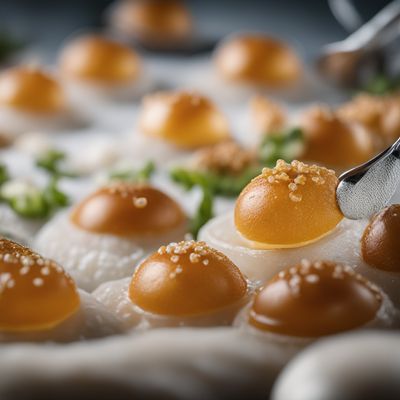
Ingredient
Gudgeons
Delicate Delights from the Water
Gudgeons, scientifically known as Gobio gobio, are small freshwater fish that are highly regarded for their delicate flavor and tender texture. These fish have a slender body, typically measuring around 10-15 centimeters in length, and are characterized by their silver-gray coloration and distinctive dark lateral line. Gudgeons are often sought after by anglers for sport fishing, but they also offer a delectable culinary experience.
Origins and history
Gudgeons are native to rivers and streams across Europe, particularly in the United Kingdom, where they are commonly found in freshwater habitats. These fish have a long history of being enjoyed as a food source, with references to gudgeon fishing dating back to medieval times. Today, gudgeons continue to be appreciated for their delicate taste and are often featured in traditional British dishes.
Nutritional information
Gudgeons are a good source of protein and contain essential nutrients such as omega-3 fatty acids, vitamin D, and selenium. These fish are also low in calories and fat, making them a healthy choice for those seeking a nutritious and flavorful meal.
Allergens
Gudgeons do not pose significant allergenic risks, but individuals with fish allergies should exercise caution and consult with a healthcare professional if they have any concerns or allergies related to fish consumption.
How to select
When selecting gudgeons, look for fish that have clear, bright eyes, shiny scales, and a fresh, mild aroma. The flesh should be firm to the touch and free from any signs of discoloration or sliminess. If purchasing whole gudgeons, ensure that the fish are properly gutted and cleaned.
Storage recommendations
To maintain the freshness and quality of gudgeons, it is best to consume them on the day of purchase. If storing them, wrap the fish tightly in plastic wrap or place them in an airtight container and refrigerate at temperatures below 40°F (4°C). Consume them within 1-2 days for optimal flavor and texture.
How to produce
Gudgeons can be found in rivers and streams across Europe, particularly in the United Kingdom. They are typically caught using fishing rods or nets by anglers who enjoy the sport of gudgeon fishing. However, due to their small size and specific habitat requirements, it is not recommended for amateur individuals to attempt to raise or produce gudgeons at home.
Preparation tips
Gudgeons can be prepared in various ways to showcase their delicate flavor and tender flesh. They can be pan-fried with a simple seasoning of salt and pepper, grilled with a drizzle of olive oil and lemon juice, or poached in a flavorful broth. These fish are often served whole, accompanied by a side of fresh greens or potatoes. When cooking gudgeons, it is important to handle them gently to preserve their delicate texture and avoid overcooking.
Culinary uses
Gudgeons are commonly used in traditional British cuisine, where they are often featured in dishes such as gudgeon fritters, fish pies, or served as a delicacy alongside other seafood. They are also popular among anglers who enjoy the sport of gudgeon fishing.
Availability
Gudgeons are primarily found in rivers and streams across Europe, particularly in the United Kingdom. They are commonly available in local fish markets, specialty seafood shops, or can be caught by anglers during the fishing season.

